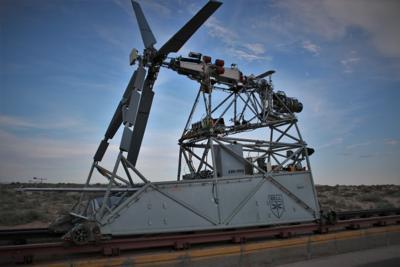Sat, Sep 16, 2023
The Past and Future of High-Speed Flight
Bell Textron Inc. has delivered a High-Speed Vertical Takeoff and Landing (HSVTOL) test-article to Holloman Air Force Base for demonstration and technology evaluation. Testing teams will leverage the Arnold Engineering Development Complex Holloman High Speed Test Track for purpose of vetting the test-article’s folding-rotor, integrated-propulsion, and flight control technologies at speeds representative of actual flight.

Bell executive vice-president of engineering Jason Hurst stated: “The HSVTOL test-article delivery and start of sled-testing operations serves as a major milestone in our mission to develop the next generation of high-speed vertical lift aircraft. Bell plans to showcase HSVTOL technology informed by more than 85-years of high-speed rotorcraft development and leverage lessons learned to produce a flying prototype with game-changing capabilities.”
Bell, by dint of the forthcoming sled-test regimen, seeks to validate key technologies by way of a full-scale, integrated demonstration in a representative operating environment. Bell plans for the test-article to execute a series of HSVTOL high-speed transition maneuvers—a first-of-its-kind capability for vertical lift aircraft. Prior to the HSVTOL test-article’s delivery to Holloman Air Force Base, Bell successfully completed functional demonstrations of the contraption at the company’s Flight Research Center.

Bell’s High-Speed Vertical Takeoff and Landing (HSVTOL) technology amalgamates the hover capability of a conventional helicopter with the speed (four-hundred-plus-knots), range, and survivability of a fixed-wing jet aircraft. Bell has developed high-speed vertical lift technology for more than 85-years, pioneering innovative VTOL configurations such as the X-14, X-22, XV-3, and XV-15 for customers the likes of NASA, the U.S. Army. and U.S. Air Force. The antecedent vehicles build on Bell’s proven history of high-speed flight, which extends back to the Bell X-1—the storied rocket-powered experimental aircraft in which then Captain Charles “Chuck” Yeager made the world’s first manned supersonic flight on 14 October 1947.
More News
He Attempted To Restart The Engine Three Times. On The Third Restart Attempt, He Noticed That Flames Were Coming Out From The Right Wing Near The Fuel Cap Analysis: The pilot repor>[...]
Make Sure You NEVER Miss A New Story From Aero-News Network Do you ever feel like you never see posts from a certain person or page on Facebook or Instagram? Here’s how you c>[...]
From 2009 (YouTube Edition): Leading Air Show Performers Give Their Best Advice for Newcomers On December 6th through December 9th, the Paris Las Vegas Hotel hosted over 1,500 air >[...]
Aero Linx: NASA ASRS ASRS captures confidential reports, analyzes the resulting aviation safety data, and disseminates vital information to the aviation community. The ASRS is an i>[...]
“For our inaugural Pylon Racing Seminar in Roswell, we were thrilled to certify 60 pilots across our six closed-course pylon race classes. Not only did this year’s PRS >[...]
 NTSB Final Report: Rutan Long-EZ
NTSB Final Report: Rutan Long-EZ ANN FAQ: Turn On Post Notifications
ANN FAQ: Turn On Post Notifications Classic Aero-TV: ICAS Perspectives - Advice for New Air Show Performers
Classic Aero-TV: ICAS Perspectives - Advice for New Air Show Performers ANN's Daily Aero-Linx (06.28.25)
ANN's Daily Aero-Linx (06.28.25) Aero-News: Quote of the Day (06.28.25)
Aero-News: Quote of the Day (06.28.25)




